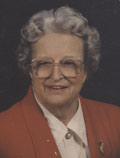The Lives and Times of Extraordinary Athenians: Sam McNeill Talmadge
by Jess Edwards, Oral History Project Intern
 The 1994 Athens Clarke County Heritage Room Oral History Project “Rendezvous with History” features interviews from World War II Veterans of Athens, as well as people who helped in the war effort. One exciting aspect of this project is discovering that many of the interviewees played pivotal roles in whatever community they were a part of, be it on the battlefield or in Athens. In this series of blog posts, we’ll take a closer look at the individuals interviewed in this collection.
The 1994 Athens Clarke County Heritage Room Oral History Project “Rendezvous with History” features interviews from World War II Veterans of Athens, as well as people who helped in the war effort. One exciting aspect of this project is discovering that many of the interviewees played pivotal roles in whatever community they were a part of, be it on the battlefield or in Athens. In this series of blog posts, we’ll take a closer look at the individuals interviewed in this collection.
Dr. Sam McNeill Talmadge, an outstanding community leader, served as a surgeon during the War. Born in 1910, Talmadge was a member of a well-established Athens family and attended the University of Georgia for his undergraduate degree. After attending Harvard Medical School, he developed his own medical practice in Athens. With the outbreak of the Second World War, he was drafted and served in Atlanta with the Army Medical Corps.
As the war continued, he served in an Auxiliary Surgical Team that required him to move to England for the war effort. While in Europe, Talmadge "leapfrogged" from one field hospital to another while he followed the platoons to perform his medical duties. In his interview, he recalls that the operations, most of which were abdominal procedures, were extremely severe due to the "devilish weapons" used by the Germans.
Like many enduring the consequences of the war, Talmadge relied on instances that broke the routine of the war to maintain an optimistic outlook. One particularly fond memory was when he was near Paris on a day off and met a Frenchman who got his degree from Harvard as well. The Frenchman generously gave Talmadge and his companion coffee, French wine, and apple pie, which would have been near impossible to obtain otherwise. Talmadge happily recalls keeping contact with this man a few times after the war as well.
Not only did Talmadge attempt to show the positives of his wartime experience, he also constantly spoke well of the people around him in his interview. He cited one nurse who worked with him as the hardest working individual that he had ever met as she attentively worked 16 to 18 hours at a time. Talmadge even spoke of the good Germans he encountered. One instance that Talmadge recounts occurred when a soldier he met after the war was shot by machine guns near the German lines and severely wounded. German aid men took him into their camp and quickly realized they lacked the medical supplies to save him. The aid men crossed onto the American lines and offered to trade the man for a German prisoner. The Americans agreed and the man's life was spared.
As Talmadge's time in the war progressed, he was assigned to work on a medical team that served the soldiers who participated in the Normandy Invasions. This was not before he saw a great deal of the rest of Europe, including the Elbe River basin and much of England. While Talmadge remembers his experiences in his interview, he covers everything from meeting general George Smith Patton, Jr. to operating in former school houses that were converted into field hospitals. By the end of the war, Talmadge was Chief of Surgery at a hospital in Northeast Germany, further proving his skill as a strong leader.
After the War, Talmadge returned to Athens where he continued to work as a surgeon until his 1969 retirement. According to the Athens Banner-Herald, he was beloved by all who interacted with him as he tried to make a difference within the Athens-Clarke County area. One colleague of Talmadge’s, Henry J. Ford, recounted him as “an excellent surgeon, a fine example of professionalism, dedicated, caring and untiring in his chosen profession.” Ford even noted the personal attention Talmadge paid to his patients in a time when rapidly improving technology sometimes overshadowed the well-being of individual patients. He remembered Talmadge's legacy in the medical field by saying, "one can't help but reflect on medical care and practice when it seemed to be provided with a more sensitive and personal approach." Ford concluded his memories of Talmadge by declaring how Talmadge's "kindness, medical expertise and gentle ways will long be remembered by those who knew him." Due to his considerate actions, Talmadge's ability as a skilled and caring doctor was seldom overlooked by those around him.
In 1937, Talmadge married Alice Eleanor Jarvis, and together they raised three children. His dedication to his life’s work made an impact on those with whom he interacted. Even after his retirement, Talmadge continued to work in the hospital system as an administrative assistant for the Athens General Hospital. He also worked with the Georgia Medical Society on a program that focused on continuing education in small hospitals in northeast Georgia. Talmadge lived an eventful and meaningful life up until his death in 2000. Talmadge was a committed and hard-working doctor during the Second World War, and a kind and generous Athenian. One can glimpse a critical component of his story in his World War II Oral History interview, available on YouTube.



 LaGrange Dupree and her husband Dan were both natives of Athens. During the war, Dan was a member of the Air Force although he did not earn his wings until spring of 1944. He was thus called to serve in Europe as a pilot shortly thereafter in September. According to LaGrange, Dan flew 13 successful missions but on a mission in Vienna, the Germans shot him down, forcing him to become their prisoner of war in a prison by the Baltic Sea. On the home front, LaGrange received a telegram declaring Dan to be missing in action the day after Christmas 1944. As the interview progresses, LaGrange remembers that “everything was in slow motion” throughout the war, as she constantly worried about the state of her husband. However, her fear did not hinder her daily life in Athens as she continued her job at Gunn's Men’s Shop while Dan was gone. Dan himself even understood LaGrange’s perseverant and independent character; Lagrange recalled he told her, “I knew you were ok even though you didn’t always know if I was alright.”
LaGrange Dupree and her husband Dan were both natives of Athens. During the war, Dan was a member of the Air Force although he did not earn his wings until spring of 1944. He was thus called to serve in Europe as a pilot shortly thereafter in September. According to LaGrange, Dan flew 13 successful missions but on a mission in Vienna, the Germans shot him down, forcing him to become their prisoner of war in a prison by the Baltic Sea. On the home front, LaGrange received a telegram declaring Dan to be missing in action the day after Christmas 1944. As the interview progresses, LaGrange remembers that “everything was in slow motion” throughout the war, as she constantly worried about the state of her husband. However, her fear did not hinder her daily life in Athens as she continued her job at Gunn's Men’s Shop while Dan was gone. Dan himself even understood LaGrange’s perseverant and independent character; Lagrange recalled he told her, “I knew you were ok even though you didn’t always know if I was alright.” 






